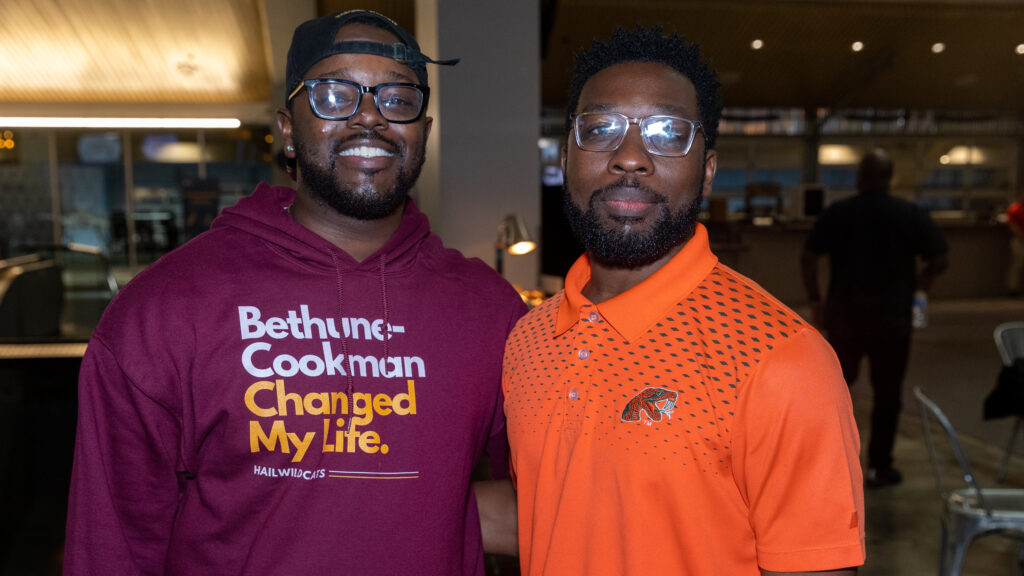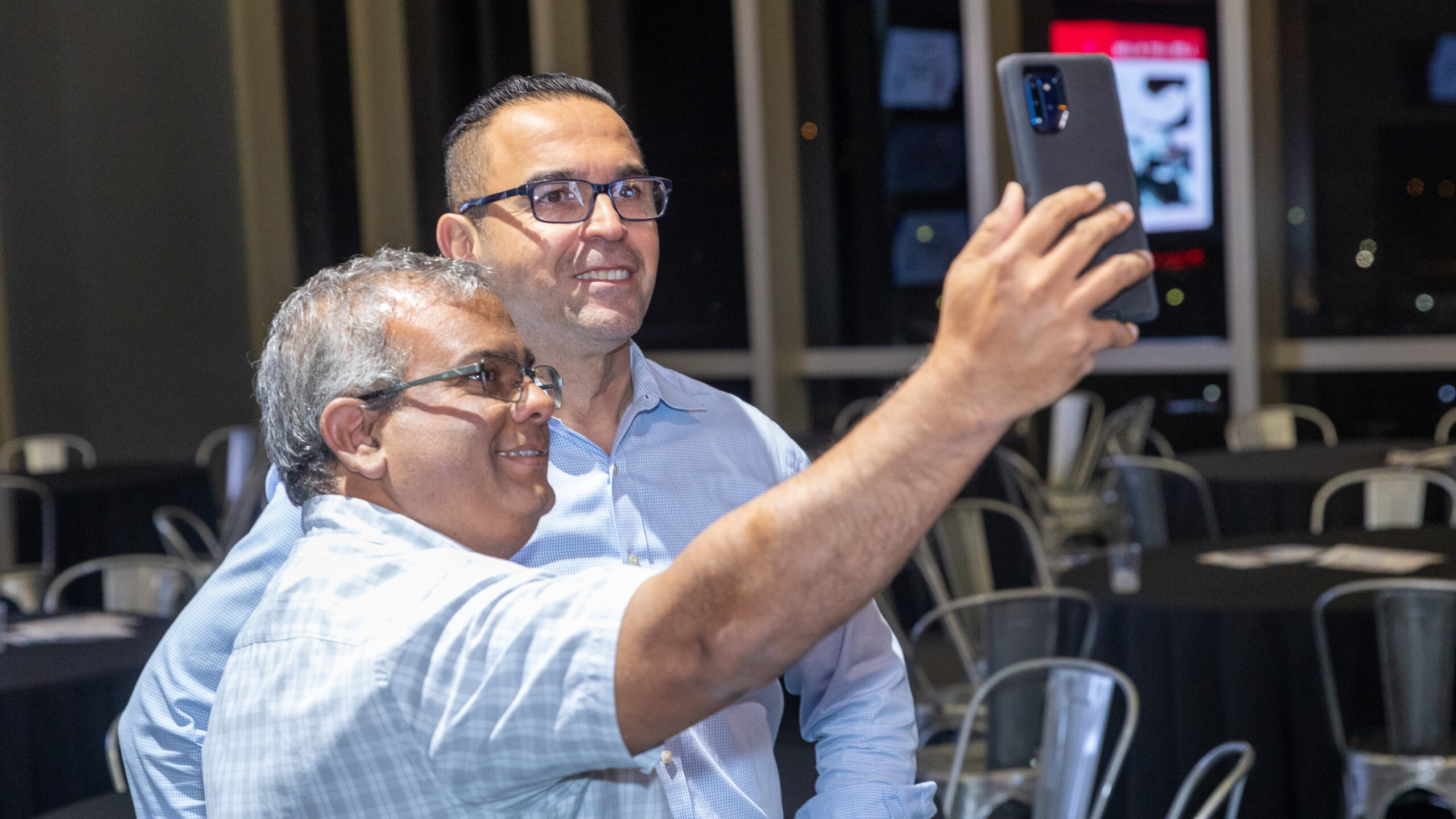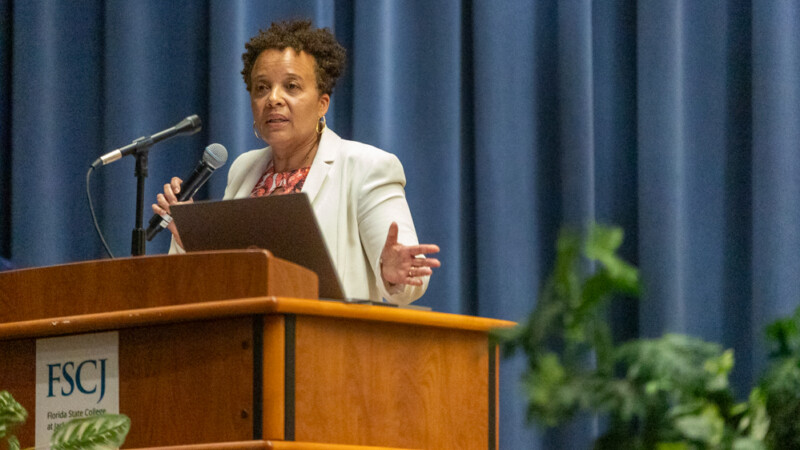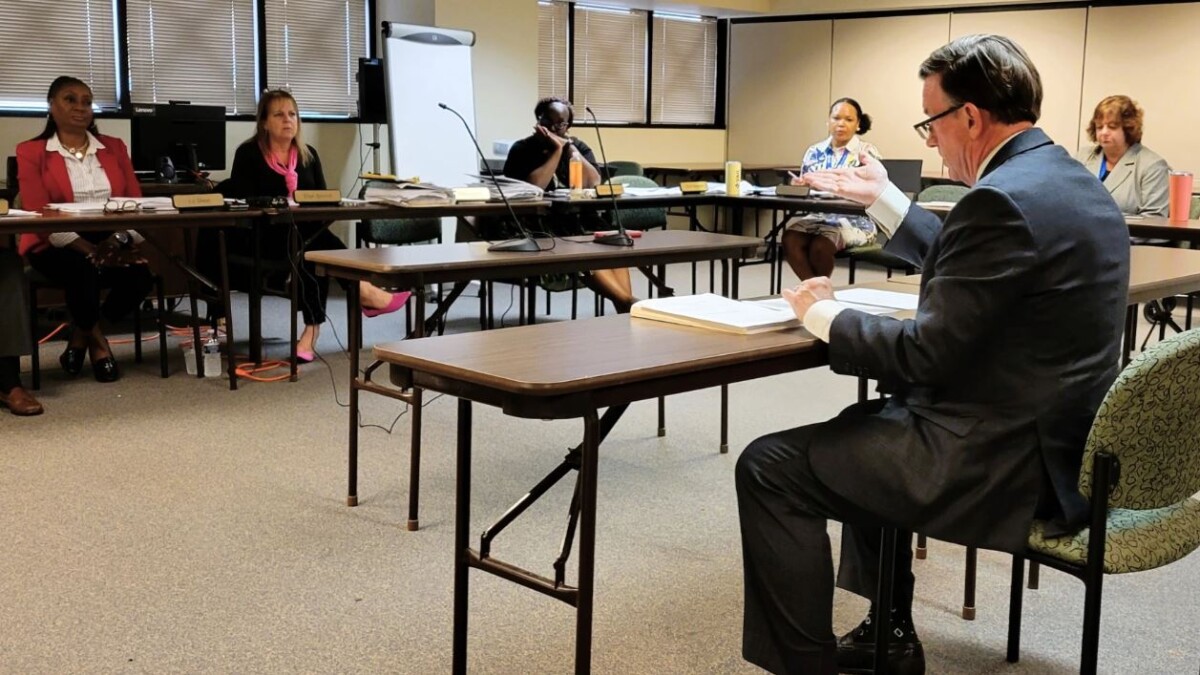Last month, Eligio Calatayud walked out of the East Club at TIAA Bank Field into the warm night, encouraged.
The Mandarin High School Spanish teacher had just spent nearly two hours connecting with other Black and brown educators from across Northeast Florida at Lift & Lead, a conference put on by the Jacksonville Public Education Fund.
Calatayud is one of 85 Hispanic male teachers in Duval County Public Schools, a district that serves around 8,000 students who speak a first language other than English.
Hope among brothers
JPEF staged the conference as part of its ongoing 17- month-long effort to try to recruit more Black and Hispanic men to classrooms to better reflect the student body. Along with the district, its goal is to have 1,000 Black and Latino men teaching in classrooms by 2025. And while that goal is still a long way off, the nonprofit finds itself facing another challenge: inspiring the teachers it already has to stay, as hiring gains have been partly offset by 187 Black and brown male teachers’ leaving over the same time period.
“This is a lonely profession,” says Calatayud, who is in his second year on the faculty at Mandarin High. “You’re in the classroom, you talk to the kids and then they leave the classroom. You’re by yourself.”
More than 3-in-4 of the district’s 6,449 instructional staff (78%) are women. Of the 1,412 male staffers as of mid-February, JPEF says 509 teachers are Black men and 85 teachers are Hispanic men. In addition, 54 principals or assistant principals are Black men and two Hispanic men serve as a principal or assistant principal.
The recruiting effort has included developing alternative certification programs for teachers without education degrees and targeting graduates of historically Black colleges and universities and Hispanic serving institutions.
Jorge Estevez, another foreign language teacher at Mandarin High, says it’s important for the district to not only hire more Hispanic men, but also diverse Spanish speakers because he’s taught students from Guatemala, Argentina, Mexico and Brazil – each with its own dialect and traditions.
“We not only translate languages, we translate cultures,” Estevez says. “It’s important to (have someone) explain what is not important for you may be important for us, what is important for you may not be important to us.”
“It is about making sure our kids have the role models in the classroom that they deserve,” says JPEF President Rachael Tutwiler Fortune.
The quest is also acute in schools filled with Black boys and girls, many of them named after Black men who were education pioneers.
William M. Raines High School was named after a longtime Jacksonville educator. Its first principal, Andrew Robinson, spent more than four decades as an educator and was an interim president at UNF in the early 1980s. Rutledge Pearson was a baseball coach and educator. Rufus Payne and Eugene Butler were principals at what was then known as Matthew Gilbert High School, and Roosevelt Daniels was active in the Florida Congress of Colored Parents and Teachers before his death in 1963.
The roadblocks
Multiple educators mentioned to Jacksonville Today that the pay is one hindrance. First-year teachers in Duval County start at $48,700 annually — a salary that an affordable housing advocate told Jacksonville Today may make it challenging to find quality housing in Duval County.
Another headwind for teachers — which went largely unspoken by the men at this month’s Lift & Lead Conference but was communicated through knowing glances — was what they see as a changing cultural attitude toward those entrusted to teach Florida’s future.
“Years ago, the teacher was respected by the community, by the parents, by the students,” says Estevez. “Nowadays, we have to fight for our word…If a parent is against one of the teachers, the parent wins most of the time. And that respect, that authority has been lost,” he says. “Here in the state of Florida, they treat us in words like first responders. But, we don’t have that trust. When it comes to our word, our work, we are not treated like first responders.”

Andrew Lodge recalls the first time he was taught by a Black man was in sixth grade: Highlands Middle School band director Moses Evans, who returned to teaching at Highlands this academic year after teaching elsewhere.
Lodge, now in his fourth year as a music educator at San Mateo Elementary, says the profession needs a rebrand if it is going to attract more Black and brown men. He believes there’s so much negativity surrounding teaching that it scares off potential candidates or leads teachers to leave the profession before they can truly appreciate it.
“A lot of people aren’t at the point to experience the fullness of what we are doing,” Lodge says. “You don’t get the full smell of the flowers until year five or year 10.”
Lodge graduated from Bethune-Cookman University, a historically Black college in Daytona Beach that was founded to cultivate Black educators. Throughout the decades, scores of Cookman alumni have become teachers in Jacksonville.
Blooming beyond stereotypes
Nick Nelson has been an educator for a decade. The second-grade teacher at Sabal Palm Elementary says ending his work day by 4 p.m., having June and July off and his impact on students are what keep him in the classroom.
Black men are often pigeonholed into being physical education teachers or administrators who mete out discipline, Nelson says, but they’re sorely needed in math, science, art and other subjects besides athletics.
“It’s vital, especially with how things are going now with the censorship of books, and X-Y-Z things going on, if you don’t have different perspectives in the classroom, you’re just going to have one-sided learning, and that’s not going to be good in the long run,” Nelson says. “You need to have Black men, Hispanic men, Asian men, white men, all kinds of men in general teaching younger children because there needs to be a different perspective of things in schools.”
Nelson, a 2022 finalist for Duval County Teacher of the Year, was educated in DCPS schools himself — he attended Lone Star Elementary and Landmark Middle before graduating from Sandalwood High – and credits one of his high school history teachers, Patrick Nolan, with encouraging him to become an educator.
Nelson recalls when he was a senior in high school his dog died, Nolan left him a letter of condolence in his locker.
“That stuck with me,” Nelson says. “Now, when I’m working with my kids, I think about the same thing: I need to invest in their lives outside of the classroom. That’s what’s made a big difference in their performance in the classroom and (in) their respect.”
Nelson, who identifies as Black and Hispanic, says he didn’t have his first Black male teacher until he was a junior at Sandalwood.
‘It’s hard to be what you cannot see’
Larry Walker, an assistant professor in the College of Community Innovation and Education at the University of Central Florida who has written extensively about systemic barriers in education and the benefit to diversifying public education, says school districts should involve their HR departments in diversifying the workforce in order to prevent unintentional gatekeeping of minority candidates.
His study last year, “Unpacking Race-Related Trauma for Black Boys: Implications for School Administrators and School Resource Officers” in the Journal of Trauma Studies in Education, also found that because Black men often do not see “themselves present in high school and college graduations, in advanced and college preparatory courses, Black males may not see themselves in the education trajectory at all.”
“You’re going to have a hard time recruiting teachers, particularly males, if their experiences as a student were terrible,” Walker tells Jacksonville Today. “A Latino male who dealt with racism (in) K-12 is not going to turn around and say, ‘I’m going to be a teacher.’”
Many of the educators at the Lift & Lead conference said finding ways to connect to students’ cultures is important to them.
One principal said he wears a rotation of more than 20 pairs of Nike Jordan sneakers to school in order to show students there is more than one way to obtain the famous kicks. And Lodge tells his students it doesn't make them a dork if they have a desire to learn.
Keeping teachers longer
In addition to recruiting more male teachers, the Duval Schools, the Jacksonville Public Education Fund and the University of North Florida are partnering on The ONES and Los UNOS initiatives created to support the Black and Latino men who are already inside the classroom.
At its February 2022 launch, Superintendent Diana Greene touted The ONES as a way to hold formal and informal conversations about how Black male educators can change the narratives about themselves.
“We want these communities to know that the classroom is a place where they can have an immediate and positive impact on their communities,” a DCPS spokesperson wrote to Jacksonville Today. “These groups provide the kind of professional network that should positively impact teacher retention.”
Though they’re still only a small percentage of the in-school faculty, Black and Latino teachers are making imprints on the lives of students.
In a video from Jacksonville’s Biscayne Elementary that went viral, second-grade teacher Dwayne Taylor offered his class free time if one girl, Harlie McCary, spelled a word correctly.
She did. The class celebrated as though the Jaguars won the Super Bowl.
“I love being a teacher altogether, but to be with this particular group of students,” Taylor told First Coast News,“I love the fact that they bond so well. We have a bond that is going to last forever.”
Walker, the UCF professor, says that public education systems must evolve to better reflect the people who are being educated.
“The students you are serving today come from diverse backgrounds,” Walker says. “The United States is an economic superpower, but understand, you have to nurture students that are behind you to ensure that the economic engine runs.”







